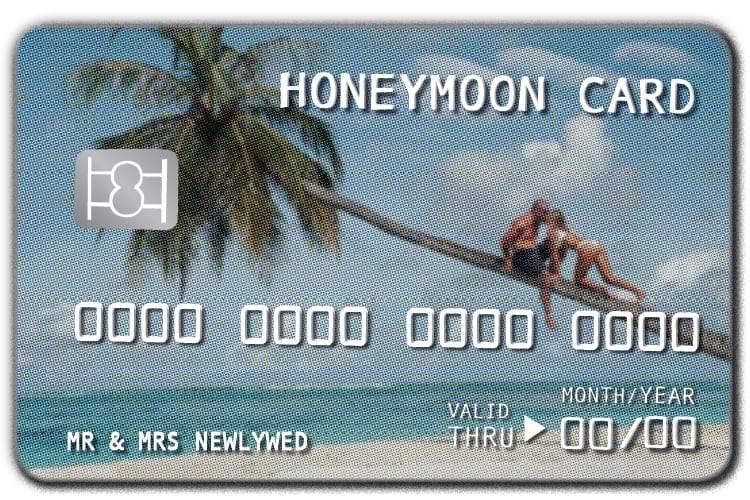
Honeymoons are essentially romantic-but-high-pressure travel plans; you want to think that you’ll be talking about this trip for decades to come. In a good way.
To afford it, you’ll want to use the right credit card(s), which can unlock perks and protections that cash and checks simply can’t provide. Besides earning you points and miles that can later be redeemed for free flights or hotel stays, certain cards provide airport lounge access, hotel room upgrades, resort credits and other amenities that can elevate the trip from “best we could do” to “I had no idea we could get that!”
Practical honeymooners take note; many cards offer trip protection and car rental insurance too. This article explains in detail exactly which cards to use for what costs (including the single best option if you want to use only one card) so you have the trip of a lifetime.
Seriously important note: Credit card rates and perks are accurate as of publish date, but we suggest you confirm the policies on each card’s website before you make any purchases as details can change. Using credit cards for big purchases reaps huge rewards but only if you plan to auto-pay immediately or pay off the bill quickly. Some cards have annual fees.
*Additional Note: Due to Covid-19, many credit card companies have extended the time period in which consumers have to meet the spend bonus. Consult the terms and conditions for each card for more information.
Best Credit Cards for Flights
When it comes to airfare, there are several types of travelers. If you’re a loyal flyer with a specific airline like American, Delta or United and you prefer to earn miles and points directly with that carrier, using a co-branded airline credit card is the best plan. This way, you’ll double-dip (earn points in two ways with just one purchase).
For example, if you’re flying American Airlines to your honeymoon destination and you buy your ticket with the Citi AAdvantage Platinum Select World Elite Mastercard, you’ll earn AAdvantage (American Airlines) miles for the flying itself, plus you’ll earn two miles for every dollar spent on the flight. Perks like free checked bags and priority boarding — which are often included with co-branded cards — can help make your journey less stressful and costly. The card has an annual fee of $99, but it’s waived the first year. Delta SkyMiles cards and United MileagePlus cards are the other major co-branded cards to seek out if either of those is your go-to airline. Some offer great bonus points for signing up… and some require large annual fees. Only you can decide which card best meets your needs. So do the research before committing to a card.
Another option is to use a flexible rewards card that gives you bonus points on flight purchases, such as the Platinum Card from American Express and the Chase Sapphire Reserve. Although these cards have higher annual fees ($550 for each), the ability to transfer those hard-earned points to various travel partners (hotels and airlines) makes the points you’ll earn especially valuable and ultimately worth more than the fee. And, things like hefty sign-up bonuses, a $200 airline fee credit (Amex Platinum) and a $300 travel statement credit (Chase Sapphire Reserve) bring that annual fee down a bit.
The Amex Platinum gives 5X points per dollar spent on flights booked through Amex Travel (an easy phone call) or directly on the airline’s website. The Chase Sapphire Reserve card offers 3X points per dollar spent on travel, which includes flights, taxis, Ubers and other modes of transportation. Plus, these cards both offer a key perk — lounge access — ensuring you’ll be hanging out in style before your flight, even if you’re cruising in economy. While the Reserve card comes with Priority Pass lounge access, the Amex Platinum comes with both Priority Pass and fancy Centurion Lounge access — although there’s a limited number of Centurion Lounges, they’re new, stylish and generally amazing.
See, there’s nothing to worry about! (via GIPHY )
Best Credit Cards for Chain Hotel Rooms
If you’re planning to stay at a larger chain brand hotel (like Marriott, IHG, Hyatt, Hilton, and Wyndham), it’s worth considering a co-branded hotel credit card so you’ll reap extra benefits during your stay. You may even want to plan a stay that revolves around one of these cards, obtaining the card well in advance so you can use some of your welcome bonus points or free nights (accrued after a few months of paying a minimum spend of around $1K to $4K) during your honeymoon.
The Hilton Aspire card offers incentives to stay, naturally, at Hilton hotels, earning you 14X points per dollar spent at Hilton properties (that’s a lot of points). You can earn 7X points at U.S. restaurants, bookings on Amex Travel and on select car rentals and 1X points on everything else. The card comes with a hefty $450 annual fee, but if you can spend $4,000 during your first three months of card membership before booking your honeymoon, the bonus of 150,000 HHonors points can get you a few free nights at your chosen Hilton property. Plus, you’ll get a $250 credit that can be applied at participating Hilton resorts and Priority Pass airport lounge access each time you fly. If you book your stay for two nights or more on hiltonhonorsaspirecard.com, you’ll also get a $100 on-property credit for participating Waldorf Astoria Hotels & Resorts and Conrad Hotels & Resorts (free poolside cocktails, anyone?).
One huge benefit that comes with that card is Hilton Diamond elite status, which gives you perks like room upgrades, late checkout, additional points-earning options, free breakfast and complimentary hotel executive lounge access at Hilton properties — all things that can amp up your honeymoon stay from OK to over-the-top. Hyatt, Marriott and IHG all have their own co-branded cards, so you can pick your favorite brand or see which chain has hotels in the city you want to visit.
Best Credit Cards for Non-Chain Hotels or Home Rentals
If you’d prefer to stay at a boutique resort or hotel that isn’t a part of any loyalty program or a home rental, it’s best to use a card like the Chase Sapphire Preferred or Chase Sapphire Reserve that offers 2X and 3X points, respectively, on travel. Typically, Airbnb gets processed as a travel purchase, but VRBO and Homeaway don’t. You’ll have to examine the annual fees and perks to decide which card is best for you.
A pro tip for anyone hoping to get some extra free hotel nights for their honeymoon: If you need to book hotel rooms for anyone coming to your wedding, do so through your own Hotels.com account. For every ten stays, you’ll get a free night stay at any hotel in their portfolio (more or less equal to the average amount you’ve spent on the ten nights), regardless of what credit card you use to book.
Best Credit Cards for Dining/Activities/Entertainment
One of the best dining cards around, the American Express Gold card (which comes with a $250 annual fee) gives you 4X points per dollar spent on dining (and at grocery stores), as well as some other perks like a $100 airline fee credit and a 35,000 Amex Membership Rewards point bonus if you spend $4,000 in the three months of card membership.
If you’re honeymoon is abroad, plan to dine out with the Capital One Savor Cash Rewards card, which gives you 4% back on dining and entertainment purchases around the world (8% on Vivid Seats ticket bookings). The popular Chase Sapphire Preferred and Reserve cards offer 2X and 3X points, respectively, per dollar spent on dining anywhere, and those points are considered especially valuable because they can be used with many transfer partners. And of course, none of the cards mentioned in this dining/entertainment section incur foreign transaction fees.
Best Credit Cards for Car Rental/Gas
The game-changing perk with car rental is getting primary insurance, which means the card’s insurance takes over before your personal auto insurance company does. Thus, you avoid an increase in your annual premium. While some cards offer either bonus points or insurance, the goal is to get both. Cards like the Chase Sapphire Preferred and Reserve cards offer 2X and 3X points on car rentals and protect you on the insurance front. United flyers may prefer to opt for the United Explorer card, which offers a 60,000 United mile bonus after spending $3,000 in the first three months of card membership. The card comes with United perks like lounge passes, free checked baggage, priority seating and Global Entry credits, as well as auto rental collision damage waiver insurance up to the actual cash value of the rental car (including theft) in the U.S. and most countries abroad.
Make sure to ask the credit card company for proof of their insurance so you can officially decline the rental car company’s pricey collision-damage waiver or loss-damage waiver extra coverage (and all the related coverage upsells). Note that this insurance may not be available in all countries, so read the fine print on each card’s terms before deciding.
Once you have your rental car, you’ll need to fill it with gas. These purchases can be put on the Amex Everyday Preferred card or the Citi AAdvantage Platinum Select, both of which give you 2X points per dollar spent at gas stations (U.S. gas stations only for the Amex). The Wells Fargo Propel card both offer 3X points per dollar spent on gas.
How Trip Insurance Protection Works
Some cards offer trip insurance if your trip is delayed or canceled for certain reasons. While each card has its own set of rules and coverage amounts, you may be reimbursed for pre-paid airfare, tours and lodging costs if your trip is affected by illness or severe weather. The credit card company may also pay for unexpected hotel or food costs if your flights are delayed or canceled, usually if by six hours or more. Some cards that offer these trip or protection benefits are the Chase Sapphire Reserve and the Chase Sapphire Preferred (yes, these two again).
If You Only Want One Credit Card
We get it. This whole credit card thing may be overwhelming, and getting multiple credit cards just may not be possible for a number of reasons (credit score, minimum spend requirements, aversion to keeping track of a bajillion cards). So, if you plan to get just one card, go for the Chase Sapphire Reserve card, which offers a variety of flexible travel rewards.
Although it has a high annual fee of $450, you’ll end up with a $300 travel credit, a 50K point bonus after spending $4,000 in the first three months, and Priority Pass airport lounge access. Plus, the card earns you 3X points on both travel (hotels, car rental, tolls, flights and more) and dining.
If you just can’t manage the $450 fee (we understand, weddings are expensive enough), then the Chase Sapphire Preferred card is a more feasible second choice, with a $95 annual fee that’s waived the first year. You’ll get 60K bonus points after spending $4,000 in the first three months but you’ll only earn 2X points per dollar spent on both travel and dining purchases — instead of 3X.
Both Chase cards allow you to earn flexible points that can be used in several different ways to redeem for travel, like booking on Chase’s travel portal or transferring points to various airline/hotel partners. With no foreign transaction fees, trip-protection insurance and car-rental insurance, these cards are ideal to use for traveling, especially on important trips where you don’t generally get a second chance to do it right.
Remember that you’re not alone in the credit card game. Newlyweds can each get their own version of the same card to double the points earning potential. If the minimum spend seems too daunting to tackle twice, you can stick with one card and add your partner as an authorized user so they can get some of the perks too. Another way to go is for each spouse to get a different card, perhaps with low or no spend requirements, thus opening up a larger variety of benefits to apply during the honeymoon. If you don’t have a spreadsheet to keep track of all your credit cards, you will soon!
Biggest Mistakes You Can Make
- Don’t pay for your trip using a debit card. You won’t earn points, miles or get any perks.
- Don’t get into debt. Accruing debt negates any added rewards, bonuses or benefits you’ll obtain using these cards. Only plan to use a rewards credit card like the ones mentioned above if you’re sure you can pay it off quickly.
- Don’t use cards that bill foreign transaction fees if traveling abroad. Why pay extra when you don’t have to?























